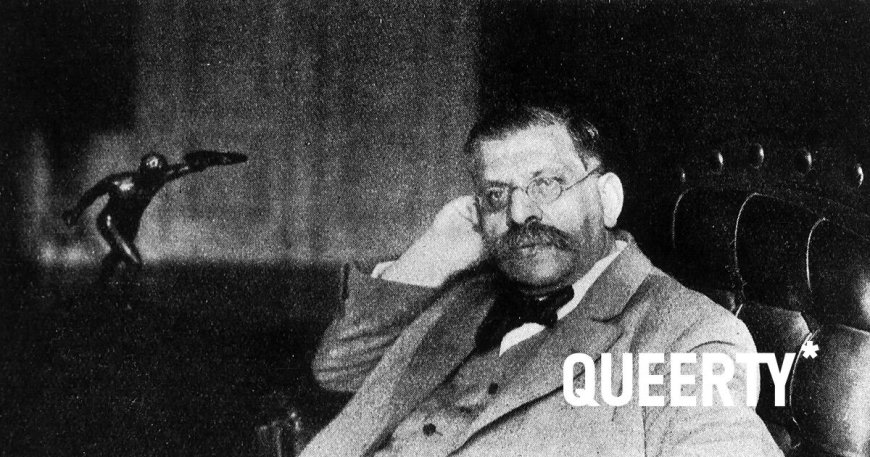This gay doctor established the world’s first trans healthcare clinic in 1919, but he left behind a complicated legacy
Magnus Hirschfeld was a gay activist and doctor who established the first known transgender healthcare clinic in Berlin in 1919.


Magnus Hirschfeld was a gay activist and doctor who established the first known transgender healthcare clinic in Berlin in 1919.
The Institute for Sexual Science was a place where queer people could learn about themselves and heal both physically and emotionally. Hirschfeld, a pioneer of transgender rights and advocate for the acceptance of trans and intersex people, used the clinic to establish safe and gender-affirming transgender healthcare.
In the 1930s, the clinic began helping trans women receive gender-affirming care, including hormone treatment, and the world’s first vaginoplasty surgery, according to Scientific American. Phalloplasty surgeries for trans men would not be practiced until the late 1940s.
Dora Richter was Hirschfeld’s patient and the first trans woman to undergo a surgical transition. Richter had been repeatedly arrested for wearing women’s clothing and was forced to serve her time behind bars with men, the latter being a problem still often faced by trans people. It was a judge who placed her under Hirschfeld’s care, where she was able to live authentically, according to an article by Them.
Hirschfeld’s history of supporting queer rights stretches back to 1897 when he established the Scientific Humanitarian Committee. The organization is largely regarded as the world’s first LGBTQ+ rights group and was established to abolish Paragraph 175, Germany’s law banning gay sex.
Hirschfeld also founded the Yearbook of Intermediate Sexual Times in 1899. It was the world’s first Journal to discuss sexual variants — known today as queer people — and was regularly published until 1923.
In 1910, Hirschfeld published a study on cross-dressing, called “the transvestites”, which is now often seen as outdated and offensive. And he helped produce the film “Different from Others” in 1919, which called for the decriminalization and acceptance of homosexuality.
The film was banned by the German government within a year of its release but a copy of the film was found in Berlin in the 1980s, and a New York Times article from 1986 even quotes the final moments of the film:
“An actor portraying Dr. Hirschfeld informs a public gathering: ‘The time will come when such tragedies will be no more, for knowledge will conquer prejudice, truth will conquer lies, and love will triumph over hatred.’”
In 1928 Hirschfeld founded the World League for Sexual Reform, which was an international conference calling for the rights to contraception and sex education and for legal and social equality of the sexes.

Despite Hirschfeld’s many contributions, he wasn’t a saint by any means and held several racist views, which unfortunately taint his legacy.
Laurie Marhoefer, a historian of queer and trans people in Weimar and Nazi Germany, wrote a book on his racism.
“His thought contains a persistent and strong anti-Black racism,” Marhoefer said in an interview with the University of Toronto Press. “He was misogynistic. His ideas about disabled people were horrible. We have to confront all that.”
“He was so important in the history of gay rights. The guy basically invented gay rights politics as it came to be in the 20th Century. We have to confront his racism and his other bad ideas.”
Marhoefer addresses the complexity of Hirschfeld’s views, crediting him with calling out racism in Nazi Germany and being able to see gay rights in the context of anti-racism and anti-imperialism.
Still, he was one of the founders of the Medical Society for Sexual Science and Eugenics, which was established in 1913.
Eugenics is a racist and ableist system of thought that proposes only certain types of people reproduce to create a society of “desirable” people. While the Nazis weren’t so keen on queerness, they fully adopted the ideas of eugenics, which took an even more extreme form in Hitler’s desire for a white Christian Europe.
This same Nazi extremism would eventually drive Hirschfeld out of Germany. As right-wing sentiments grew in Germany in the 1920s and ’30s, Hirschfeld and the queer community became faced with increasing danger.
As a Jewish gay man, he was a regular target of violence. He was first assaulted by right-wing extremists in 1920, and in the following years, the attacks became more common, including disruptions to his speaking events, according to Britannica.
As a critic of Paragraph 175 and an advocate for abortion access and women’s rights, the Nazis despised Hirschfeld. Hitler personally called him out as being protected by the state, according to scholar Liz Tracey.
(Side note: If Hitler is personally singling you out, you’re probably doing something right!)
By 1932, Hirschfeld was unable to return to Germany following an international lecture tour. The following year, the Nazis raided the Institute for Sexual Science and burned the contents of its library, a treasure trove of pro-LGBTQ+ writings and one-of-a-kind transgender medical research. In the years that followed, they tortured and murdered millions of Jewish people, including queer and disabled people.
Hirschfeld didn’t live to see the full horrors of the Holocaust. He died of sudden medial complications in 1935 while living in France. While his legacy remains complicated, there is no denying the positive impact he’s made on Trans healthcare.

 Mark
Mark 





